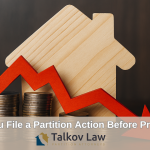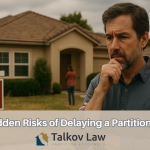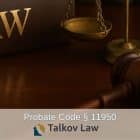
Talkov Law Partition Attorneys
10880 Wilshire Blvd #1101
Los Angeles, CA, 90024
Los Angeles, known for its luxury real estate and iconic neighborhoods, boasts some of the most valuable properties in the nation. From hillside estates in the Hollywood Hills to oceanfront homes in Malibu—and even suburban homes in neighborhoods like Burbank or Long Beach—high-equity properties often involve co-ownership arrangements that can lead to disputes. When conflicts arise, a partition action offers a legal solution to protect your financial interests and achieve a fair resolution.
At Talkov Law Partition Attorneys, we specialize in resolving co-ownership disputes for owners of multimillion-dollar properties. Whether you’re a family member, investor, or business partner, our experienced attorneys deliver tailored strategies to navigate the complexities of partition actions with professionalism and discretion.
With deep expertise in partition law and the Los Angeles real estate market, we provide the high-level representation you need to safeguard your valuable assets.
Why Choose Talkov Law for Los Angeles Partition Actions?

California’s Largest Partition Law Firm

Over 500 Partition Actions Successfully Resolved

Local Expertise in Los Angeles Real Estate

$211 Million in Real Estate Sold or Refinanced

Free Case Consultations

Tailored Strategies for High-Equity Property
Contact Talkov Law For Help
Contact Talkov Law Partition Attorneys today for a free consultation and let California’s largest and most trusted partition law firm guide you to a successful resolution.
What is a Partition Action in Los Angeles?
A partition action is a legal process used to resolve disputes between co-owners of real property who cannot agree on how to manage or divide the property.
This type of lawsuit is common when there are disagreements among co-owners, such as family members, business partners, or investors—about selling, using, or dividing a shared property.
Who Needs a Partition Action?
In Los Angeles, a partition action can be initiated by any co-owner of real property or personal property (such as shares in a business or other jointly owned assets) who has not waived their right to partition. Below are the key groups and situations where a partition action might be applicable:
Co-Owners of Real Property
Any person who owns property as a co-tenant has the right to bring a partition action. This includes:
- Joint Tenants: Co-owners with equal shares who acquired the property together and have rights of survivorship.
- Tenants in Common: Co-owners with potentially unequal shares and no rights of survivorship.
Heirs of Inherited Property
- If you’ve inherited a property with siblings or other family members, and you can’t agree on what to do with it—like whether to sell it or keep it—a partition action can help.
- This is common when families inherit a house or land but have different ideas about how to move forward.
Ex-Boyfriends / Ex-Girlfriends
- Couples who purchased property together but are not married may file a partition action if their relationship ends and they disagree about the property’s future.
Business Partners or Investors
- Business partners or investors who jointly own commercial properties, rental units, or land can use partition actions to divide or sell the property if they cannot agree on its management or sale.
Partition actions are a powerful legal tool for resolving disputes among co-owners of property. Whether you’re a co-owner facing disagreements with other heirs over inherited property, business partners who no longer see eye-to-eye, or an unmarried couple splitting up, a partition action can provide a fair solution.
By forcing the sale or division of the property, it ensures that everyone’s interests are addressed, even when parties cannot agree.
If you’re in a situation where co-ownership has become unmanageable, seeking help from an experienced partition attorney can guide you through the process and help protect your rights.
What are the Different Types of Partition Actions in Los Angeles?
In Los Angeles, partition actions are legal remedies that allow co-owners of property to resolve disputes by dividing or selling the property. The type of partition action pursued depends on the nature of the property and the co-owners’ circumstances.
Below are the three primary types of partition actions:
Partition by Sale
The property is sold, and the proceeds are divided among the co-owners based on their ownership shares. This is the most common option in Los Angeles, especially for urban properties like homes and commercial real estate, where physical division is impractical.
It ensures that each co-owner receives their fair share of the property’s value, even if there is disagreement about whether to sell. Courts often prefer partition by sale for high-value or luxury properties.
Partition in Kind
The property is physically divided among the co-owners. While more suitable for large, undeveloped land, this method is rare in Los Angeles due to small lot sizes, zoning restrictions, and the potential to decrease property value.
In cases where partition in kind is feasible, the court strives to ensure the division is fair and does not disadvantage any co-owner.
Partition by Appraisal
One co-owner buys out the others at a fair market value determined by an appraisal. This option is ideal when one party wants to retain full ownership, such as in family or business disputes.
It avoids the need for a public sale, saving time and reducing potential conflicts over pricing or timing. Partition by appraisal can be a faster and more private resolution when all parties agree.
Each type of partition action has its advantages and challenges, and the best choice depends on the specific circumstances of the co-owners and the property. In Los Angeles, with its high real estate values and unique property considerations, partition by sale is often the most practical and commonly used option. However, consulting an experienced partition attorney can help you determine the best path forward, ensuring that your interests are protected throughout the process.
How Much Does a Partition Action Cost in Los Angeles?
Partition actions come with various expenses, including attorney fees, court fees, appraiser fees, and other legal costs. On average, these costs amount to approximately $20,000. However, depending on the complexity of the case, expenses can range significantly—some straightforward cases may incur costs as low as $5,000, while more intricate disputes involving high-value properties or contentious co-owners may exceed $20,000.
In most cases, these expenses are divided among the co-owners in proportion to their ownership interests. This means that each co-owner contributes to covering the costs based on the percentage of the property they own. Additionally, the court has discretion to adjust how costs are allocated. For instance, if one party delays the process, acts unreasonably, or bears more responsibility for the dispute, the court may require that party to cover a larger share of the expenses.

How Long Does a Partition Action Take in Los Angeles?
Partition actions in Los Angeles are typically resolved within approximately 7 months, with most cases concluding through a buyout or a mutually agreed-upon sale of the property. This general partition timeframe reflects the efficiency of resolving straightforward disputes where the parties are willing to negotiate. However, the duration can vary significantly depending on several factors, such as the complexity of the case, disputes over property valuation or ownership shares, and the level of cooperation between co-owners.
In cases involving high-value or luxury properties, additional time may be required for specialized appraisals, marketing the property to the right buyers, or addressing unique legal challenges such as liens or zoning restrictions.
Similarly, if one party refuses to cooperate or disputes arise during the process, the timeline may extend as the court addresses these issues. While many cases can be resolved quickly with the help of experienced partition attorneys, more contentious or intricate situations may take longer to reach a resolution.
Step-by-Step Guide to a Partition Action in Los Angeles
Disputes between co-owners of property can become stressful, especially when no agreement can be reached on how to manage, use, or sell the property. In these situations, a partition action may be the best solution. A partition action is a legal process that allows co-owners to divide or sell jointly owned real estate when they cannot resolve their differences. For property owners in Los Angeles, where real estate values are high and ownership disputes are common, understanding the partition process is essential to protecting your rights and ensuring a fair outcome.
This guide provides a step-by-step overview of how a partition action works, so you can navigate the process with confidence.
- Evaluate the Need for a Partition Action
Determine whether a partition action is necessary. If co-owners cannot agree on the use, management, or sale of a property, partition may be the only solution. Consider alternatives like mediation or buyouts if they’re viable.
- Confirm Your Right to Partition
Verify that you have a legal right to file a partition action. In California, co-owners holding property as tenants in common or joint tenants generally have this right unless there’s an agreement waiving it.
- Hire an Experienced Partition Attorney
Seek legal counsel familiar with Los Angeles real estate and partition laws. A knowledgeable attorney will help protect your interests, navigate the legal process, and handle court filings.
- Serve the Other Co-Owners
All other co-owners and interested parties (e.g., lienholders) must be notified of the action. Proper service of process ensures that all parties have the opportunity to participate.
- Participate in Court Proceedings
Attend court hearings to present your case. The court may appoint a referee to evaluate the property and recommend the best method of partition (division or sale).
- Determine the Partition Method
The court will decide whether the property should be divided physically (partition in kind) or sold (partition by sale). If physical division is impractical or would harm the property’s value, the court typically orders a sale, with proceeds distributed among the co-owners.
- Appoint a Referee
If the court orders a sale, a referee or real estate agent may be appointed to oversee the process, ensuring that the sale is conducted fairly and at market value.
- Address Costs and Expenses
Partition costs, including legal fees, referee fees, and sale-related expenses, are typically divided among the co-owners. The court may adjust this distribution based on each party’s contributions or conduct.
- Distribute the Proceeds or Property
After the sale or division, the proceeds or portions of the property are distributed according to the ownership shares and any adjustments ordered by the court (e.g., reimbursement for property expenses).
Areas Served in Los Angeles

Talkov Law Partition Attorneys
10880 Wilshire Blvd #1101
Los Angeles, CA, 90024
Talkov Law Partition Attorneys serve clients across Los Angeles County, providing skilled representation in co-ownership and partition disputes. Our attorneys handle a wide range of properties, from modern condominiums in Downtown Los Angeles and historic homes in Hancock Park to hillside residences in Mount Washington and investment properties in Koreatown.
Our practice extends beyond the city center into neighboring communities, ensuring property owners across the region have access to tailored legal solutions. In addition to serving clients throughout Los Angeles, our partition attorneys represent property owners in nearby areas including Pasadena, Beverly Hills, West Hollywood, Santa Monica, Brentwood, Glendale, Burbank, Malibu, and the greater Los Angeles County.
Our Team of Los Angeles Partition Lawyers
Talkov Law proudly serves clients throughout Los Angeles, offering trusted legal guidance in partition actions and real estate disputes. Our centrally located office makes it easy for property owners across the city to access skilled representation.







Getting Your Money Faster with Talkov Law Partition Lawyers
At Talkov Law, we understand that delays in resolving co-ownership disputes can leave your equity tied up, preventing you from accessing the financial resources you deserve. Our experienced Los Angeles partition lawyers are here to streamline the process, helping you resolve disputes efficiently and unlock your share of the property’s value faster.
By guiding you through the complexities of partition actions, we ensure that you can move forward without unnecessary delays. In Los Angeles’ high-value real estate market, our expertise ensures you get the maximum value for your property as quickly as possible.
Don’t Wait: How Delaying a Partition Action Can Cost You
Delaying a partition action can have serious financial and legal consequences. Here’s why waiting can hurt you:
- Decreasing Property Value: Real estate markets fluctuate, and waiting could result in a decline in the property’s value. In a high-value market like Los Angeles, even a small dip can significantly impact your share of the proceeds.
- Mounting Expenses: As time passes, expenses like property taxes, maintenance costs, and mortgage payments continue to add up. If one co-owner is shouldering these costs alone, they might seek reimbursement from your share during the partition process.
- Conflict Escalation: Disputes between co-owners often worsen over time, making the resolution more complicated and potentially more expensive.
- Missed Opportunities: Your equity remains tied up in the property, limiting your ability to invest in other opportunities or address pressing financial needs.
- Legal Complexities: Prolonged disputes can lead to additional legal complications, such as liens or claims from creditors, which may reduce the net proceeds you receive after the partition action.
Acting promptly to file a partition action can help you avoid these pitfalls, preserve your equity, and minimize financial and emotional strain. A skilled partition lawyer, like those at Talkov Law, can help you resolve co-ownership disputes efficiently, ensuring you don’t lose out by waiting.
Frequently Asked Questions About Los Angeles Partitions
How does Los Angeles’ real estate market affect partition actions?
Los Angeles’ competitive and high-value real estate market can impact the timeline, property valuation, and sales strategy for partition actions. High-equity and luxury properties often require specialized appraisals and marketing to secure the best possible price.
What if a co-owner lives on the property in Los Angeles?
If one co-owner is living on the property, the court may address compensation for exclusive use, especially for high-equity homes. This can involve determining fair rental value or offsetting expenses during the partition process.
Do luxury properties in Los Angeles require a different approach in partition actions?
Yes, luxury properties often demand expert valuation and a strategic sales approach to maximize their market potential. These cases may also involve unique considerations, such as shared amenities, architectural features, or high-profile buyers.
What happens if a co-owner refuses to cooperate in a partition action in Los Angeles?
Non-cooperation from a co-owner can lead to delays, but the court has the authority to compel a sale or division of the property. Experienced partition attorneys can help navigate these challenges to ensure a fair outcome.
Can Partition Be Used for Commercial Properties?
Yes, partition actions are not limited to residential properties. They can also be used to resolve disputes over commercial, industrial, or mixed-use properties owned by multiple parties.
Results for Our Clients in California

$50 Million Recovered

$9 Million Recovered

$9 Million Recovered

$3 Million Recovered
Commercial Property Partitions in Los Angeles
Partition actions for commercial properties in Los Angeles come with unique challenges due to zoning laws, valuation complexities, and ownership structures. Strict zoning and land use regulations may limit how the property can be used or marketed, while accurate valuations require assessing factors like rental income, lease agreements, and future development potential. Existing lease agreements can also impact marketability, as buyers may need to honor ongoing tenant contracts.
Additionally, many commercial properties are held in shared ownership structures, such as partnerships or LLCs, which can complicate the partition process. Combined with the often lengthy timeline to sell high-value commercial properties due to a smaller pool of qualified buyers, these cases require skilled legal representation to ensure a successful resolution.
Disputes between business partners over commercial property can quickly become complex, often involving disagreements about property management, financial contributions, or whether to sell or retain the asset. Talkov Law Partition Attorneys specializes in resolving these conflicts efficiently, protecting your investment, and ensuring a fair outcome for all parties involved.

Scott Talkov is the founder and managing attorney of Talkov Law Partition Attorneys, California’s largest partition law firm. With over a decade of experience in real estate litigation, Scott has successfully resolved more than 400 partition actions across the state, helping clients recover millions in equity from co-owned properties. His unparalleled expertise in partition law and his commitment to client success have made him a leading authority in resolving co-ownership disputes for high-value real estate.
As a trusted advocate, Scott combines strategic thinking and a results-driven approach to deliver exceptional outcomes for clients. Under his leadership, Talkov Law has become the go-to firm for property owners navigating complex partition cases.
Los Angeles Partition Case Study
Richmond v. Dofflemyer: Key Lessons from a Partition Action Case
The case of Richmond v. Dofflemyer (1980) 105 Cal.App.3d 745 is a foundational example of how courts handle disputes over the partition of jointly owned property. The case arose when two co-owners, Richmond and Dofflemyer, each holding a 50% interest in a parcel of real estate, disagreed on what to do with the property. Richmond sought a partition to divide or sell the property, while Dofflemyer opposed the partition.
The court ruled in favor of partition, affirming the right of co-owners to divide or sell shared property when they cannot agree on its use. However, the court established important guidelines to ensure the process is conducted fairly and equitably:
- Fair Treatment of Co-Owners: The court emphasized that the partition must not unfairly benefit or harm either party. The process should aim to treat both owners as equals in terms of their respective rights and interests.
- Preservation of Property Value: The court underscored the importance of maintaining the property’s value during the partition. Whether the property is physically divided or sold, the method should avoid diminishing its worth.
- Minimizing Hardship: The court sought to prevent unnecessary hardship for either party. For example, if one co-owner has personal or financial ties to the property, the partition should account for those considerations within the bounds of fairness.
- Compliance with Partition Laws: The ruling highlighted that any partition must adhere to established legal principles governing real estate and co-ownership. This ensures that the process is not only fair but also lawful.
- Public Interest and Policy: The court acknowledged that partition actions should align with broader public policies, such as preserving property value and protecting co-owners’ rights. These considerations ensure that private disputes do not negatively affect the community or undermine legal standards.
Ultimately, the court’s decision balanced the legal right to partition with the practical need to preserve equity, property value, and fairness. Richmond v. Dofflemyer serves as a vital precedent, demonstrating the nuanced approach courts take when resolving co-ownership disputes.
More Resources for Los Angeles Partition Actions
Partition Attorneys Throughout California
Talkov Law assists property co-owners across California in areas such as Orange County, Alameda County, Inland Empire, Silicon Valley, San Bernardino County, Contra Costa County, Fresno County, Ventura County, San Mateo County, Sonoma County, Santa Barbara County, Monterey County, Santa Cruz County, Long Beach, Oakland, Anaheim, Santa Ana, Irvine, Chula Vista, and Rancho Cucamonga.











































































































































